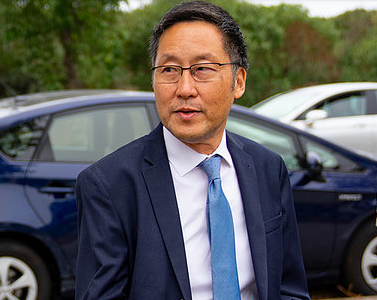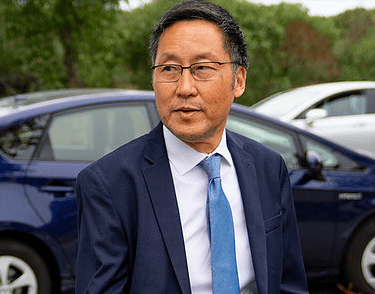
The San Francisco supes today refused by one vote to put a measure on the ballot creating a public advocate to focus on public corruption.
Two of the supes who are typically part of the progressive coalition – Aaron Peskin and Sandra Lee Fewer – voted against the measure, citing the potential cost and saying that a new department won’t solve the problem.

Sup. Gordon Mar, who introduced the measure, said that “the system we have has failed our city, consistently and structurally, for decades.”
He cited the recent scandals over the Department of Public Works and its former director, Mohammed Nuru, and said that “this is a symptom of a system that has rewarded malfeasance.”
He asked that the measure be put on the ballot so the voters could choose, and cited polls showing overwhelming support for the new watchdog position.
“We can defend the broken system and the status quo,” he said, “or give the people a chance to change it.”
Yes, Mar said, the measure will cost money – but less than $1 million a year. That’s compared to the $61 million the city lost because of a bad and apparently corrupt deal to award a public toilet contract to a French company without real competitive bidding.
Sup. Catherine Stefani, who is probably the most conservative member of the board, repeated what she had said in committee: “I don’t think San Francisco needs another elected official to do what we already have people in place to do.”
She pointed out – as did others – that the controller, the city attorney, the district attorney, the Ethics Commission, and the board itself has the authority and the ability to expose and root out corruption.
Peskin said that Mar’s argument about the Nuru scandal was an argument against a public advocate – “all of the individuals you have mentioned have been held accountable.” The board, he said, and the other institutions in the city are capable of handling the problem of corruption – and if, for example, the Ethics Commission is not doing its job or is underfunded, “let’s fix the Ethics Commission.”
Sup. Matt Haney pointed out that, while plenty of city offices have some oversight over potential corruption, “nobody is doing it full time. The public trust has been shaken.”
Let me just say, after watching the city function for more than 35 years: The DA primarily pursues criminal cases, and some corruption doesn’t rise to the level of a criminal indictment. (I have high hopes for the current DA, but I have followed four of them in my career, and not one has ever done even a modestly competent job pursuing municipal corruption. Even obviously cases have been ignored. Instead, that responsibility has been left to the FBI. In this case, Trump’s FBI. Not ideal at all.)
The city attorney, as Sup. Hillary Ronen noted, represents the same department heads and elected officials as the office could be investigating. The Ethics Commission is largely a complaint-driven agency; there’s nobody there who actively seeks to find political corruption. The controller has a huge job overseeing city money. The Sunshine Task Force has no enforcement authority. The supervisors are an oversight body, and that can be powerful – but they are primarily legislators, and there is no person on the board’s staff whose primary job is to investigate potential corruption.
Once upon a time, the local news media could take on some of that job (although the dailies typically did it badly). Today, there are far fewer reporters with far fewer resources watching City Hall.
“This,” Ronen said, “is the missing piece of the puzzle. We no longer need the FBI coming into our city several times a year.”
Rafael Mandelman said that “a new underfunded office is not going to sole the problem.” Peskin said the city is facing a massive budget crisis.
And in the end, only Ronen, Mar, Dean Preston, Shamann Walton, and Matt Haney voted yes. So the measure is dead, for now.
“Pretty incredible we can’t get six supervisors to vote for this,” Haney told me.
The supes did agree to put a measure on the ballot to split the Department of Public Works, creating a new division to oversee street cleaning and putting DPW under a commission. That would cost more money than the public advocate, but in this case Peskin and Fewer said it was important and voted yes.
Along the way, there was a weird moment.
Mandelman opposed the measure, saying that he didn’t think a commission or a new “bureaucracy” would solve the problem of filthy streets.
“The way to solve dirty streets is to solve homelessness,” he said.
Walton gently pointed out that that’s just wrong. “I hope my colleague didn’t mean to say that homelessness is responsible for dirty streets,” he said, pointing out that in his district, there’s a history of illegal dumping, poor sanitation, and overall neglect that has nothing to do with homeless people.
“I think some people in my district would find that offensive,” he said.
So would a lot of homeless advocates.
The board unanimously agreed to put on the ballot a measure that would end the rule setting the number of sworn police officers as part of the charter.
The makeup of the board will change after the November elections, and it’s entirely possible that the 2021 supes will include six who are willing to try again for a public advocate. John Avalos, who is challenging Ahsha Safai, supports the idea. Both progressive candidates in D7, Vilaska Nguyen and Myrna Melgar, support it.
So the idea isn’t dead.
I always thought the proposal could have gone further, and maybe in the future it will. If it were up to me, I would have Sunshine Task Force send its conclusions not to the Ethics Commission, which has never acted once on a single finding, but to the public advocate, and give that agency the authority to order the release of public records.
I would give the public advocate the authority to create standards for the preservation of public records and task that office with finding ways to create a database of all communications normally undertaken and all documents normally created by any public agency so that nobody has to spend time with public records requests – it would all be available anyway.
I would make sure that the office had a full-time investigator tracking all campaign contributions to all elected officials and cross-referencing them to anyone doing business with, lobbying, or seeking any sort of permit from the city.
Next year.


